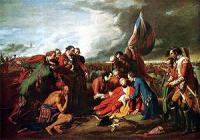Home | Military Conflict | Seven Years War
|
|
|
The Seven Years' War was a global military conflict between 1756 and 1763, involving most of the great powers of the time and affecting Europe, North America, Central America, the West African coast, India, and the Philippines. In the historiography of some countries, the war is alternatively named after combats in the respective theaters: the French and Indian War (North America, 1754 � 63), Pomeranian War (Sweden and Prussia, 1757 � 62), Third Carnatic War (Indian subcontinent, 1757 � 63), and Third Silesian War (Prussia and Austria, 1756 � 63). The war was driven by the antagonism between Great Britain (in personal union with Hanover) and the Bourbons (in France and Spain), resulting from overlapping interests in their colonial and trade empires, and by the antagonism between the Hohenzollerns (in Prussia) and Habsburgs (Holy Roman Emperors and archdukes in Austria), resulting from territorial and hegemonial conflicts in the Holy Roman Empire. The Diplomatic Revolution established an Anglo-Prussian camp, allied with some smaller German states and later Portugal, as well as an Austro-French camp, allied with Sweden, Saxony and later Spain. The Russian Empire left its offensive alliance with the Habsburgs on the succession of Peter III, and like Sweden concluded a separate peace with Prussia in 1762. The war ended with the peace treaties of Paris (Bourbon France and Spain, Great Britain) and of Hubertusburg (Hohenzollerns, Habsburgs, Saxon elector) in 1763. The war was characterized by sieges and arson of towns as well as open battles involving extremely heavy losses; overall, some 900,000 to 1,400,000 people died. Great Britain excelled her Bourbon rivals in the contested overseas territories, gaining the bulk of New France, Spanish Florida, some Caribbean islands, Senegal and superiority over the French outposts on the Indian subcontinent. The native American tribes were excluded from the peace settlement, and were unable to return to their former status after the resulting Pontiac's rebellion. In Europe, Frederick II of Prussia failed to complete a preemptive strike against Austria, and his numerically superior opponents repulsed and nearly annilihated his forces at Kunersdorf. Frederick however recovered, regained ground and managed to avoid any concessions in Hubertusburg, where the status quo ante bellum was restored. William Pitt's saying that "America was won in Germany" referred to the Prussian war effort, which enabled Great Britain to keep her continental commitment limited and focus on her "blue water policy," successfully establishing naval supremacy. French and allied forces were able to occupy Prussian and Hanoveranian territories up to East Frisia. French ambitions to invade Britain and to continue with their guerre de course were thwarted by a British naval blockade, which also impaired French supply routes to the colonies. The involvement of Portugal, Spain and Sweden did not return them to their former status as great powers. Spain's short intervention resulted in the loss of Florida, though she gained French Louisiana west of the Mississippi in exchange and Britain returned Cuba as well as the Philippines. |




 RSS
RSS